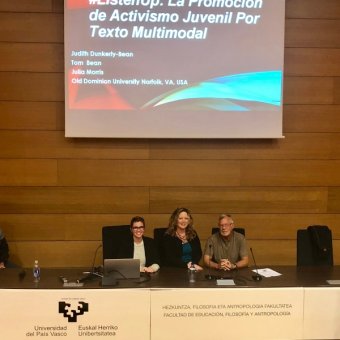By Breanna Bowman and Megan Shearin
Drs. Judith Dunkerly-Bean and Thomas Bean presenting their research at the Transformative Leadership Congress
The Commonwealth of Virginia leads the nation in youth incarceration and Hampton Roads has the highest juvenile incarceration rate in the state. Drs. Judith Dunkerly-Bean and Thomas Bean in the Department of Teaching & Learning with Old Dominion University's Darden College of Education and Professional Studies are working to change those statistics.
Since June 2017, they have been partnering with Tidewater Youth Services Foundation to provide mentoring to youth in the juvenile justice system who are awaiting trial or have been removed from their families for other reasons. Every week, the researchers visit the teens at a local group home to facilitate authentic literacy and identity experiences.
"The chief concepts for what we are doing from the time we walked in is treating them not like juvenile delinquents, but just like kids and co-researchers," said Dunkerly-Bean.
Initially, the researchers thought they would be teaching struggling kids school-based literacy, which aims to address improving reading and writing through strategy instruction. What they found, very quickly, is that standard academic literacy was not the issue.
"We saw early on that the kids were disconnected to the traditional classroom because they have been moved around from school to detention centers and typically treated like their voices aren't important," said Dunkerly-Bean.
When the researchers realized that a traditional approach would not work, they brainstormed different ideas to effectively teach literacy. An important first step was to gain the trust of the kids.
"It was a very pivotal moment when we realized that we had to change our strategy and hand it over to the kids," adds Dunkerly-Bean.
It wasn't easy, but it worked.
For example, the researchers provided the students the freedom to express themselves through original musical lyrics, poetry and art. Dr. Bean brought in his guitar so they could sing. The students created written and visual pieces about subjects important to them, detailing their life experiences.
One female student wrote a song about seeing her brother being killed. Other students illustrated their aspirations for someone to really listen. That desire became the impetus for their efforts in creating #ListenUp.
Julia Morris, a doctoral student in the curriculum and instruction program, has been intricately involved in the project since the beginning.
"It hasn't always been easy, but Dr. Bean and Dr. Dunkerly-Bean have been exemplary in being persistent in this process," said Morris. "It is the true definition of research for a purpose."
Currently, the researchers are working with the students on a project entitled, #ListenUp, which allows them to combine all these forms of literacy and use their voices as platforms to oppressive systems in solidarity with other teens struggling with similar issues. Topics vary from social justice issues, U.S. immigration policies, to nutritional inadequacies of the jail system.
According to Drs. Dunkerly-Bean and Bean, the topics revealed through #ListenUp have been pivotal. Yet, the students have reservations.
"One student said to me 'What good is all this writing if no one will listen,'" said Dunkerly-Bean.
The researchers are determined for the students to be heard. They plan to publish their research through peer-reviewed journals, share information with the juvenile justice system and hope to develop a website showcasing the work of justice-system involved youth. This past week they presented their research on an international platform at the 10th Annual Critical Pedagogy and Transformative Leadership Congress held in Spain, October 7 - 13.
Ultimately, these researchers hope that Old Dominion University might be able to help reverse the school-to-prison pipeline. Starting from the Hampton Roads area by bringing voices to the marginalized.





